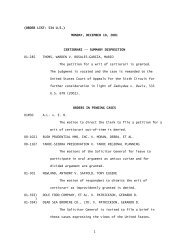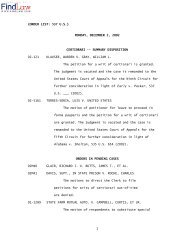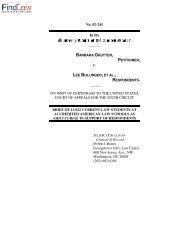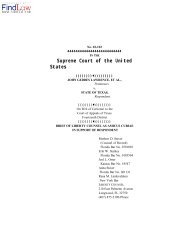No. 01-1757 Stogner v. California - FindLaw: Supreme Court Center
No. 01-1757 Stogner v. California - FindLaw: Supreme Court Center
No. 01-1757 Stogner v. California - FindLaw: Supreme Court Center
Create successful ePaper yourself
Turn your PDF publications into a flip-book with our unique Google optimized e-Paper software.
22<br />
Although a statute of limitations provides a potential<br />
bar to prosecution at a later date, it is “available” only to<br />
the extent that, if the State fails to prosecute within a<br />
specified period of time, the defendant may invoke it to<br />
prevent his prosecution. The incipient nature of a statute<br />
of limitations defense at the time the crime is committed<br />
makes evident the fundamental difference in purpose and<br />
effect between it and a defense of the type described in<br />
Collins. A statute of limitations has no effect on the criminal<br />
nature of an act; a person who is successful in asserting<br />
a statute of limitations bar is just as much a criminal<br />
as he or she was the day the act was committed. In contrast,<br />
“pure” defenses, such as self-defense and heat of<br />
passion, are available at the time the crime is committed.<br />
Because they relate to an element of the defense, if successful<br />
they transform what otherwise would have been a<br />
criminal act into something that is not criminal or is of a<br />
lesser criminal nature when applied to the defendant. 3<br />
It is well-settled by both state and federal courts that<br />
the statute of limitations may be extended during its term<br />
without running afoul of the Ex Post Facto Clause. See<br />
People v. Frazer, 21 Cal. 4th at 760-65 & n.25 (collecting<br />
the burden of proof to the defendant to establish the statute of limitations<br />
as a defense).<br />
3<br />
Likewise, the State could not retroactively abolish the defense of<br />
mistaken identification. Identity, meaning the doing of the criminal act<br />
by the defendant, is an essential element of any crime. United States v.<br />
Garcia-Rosa, 876 F.2d 209, 224 n.12 (1st Cir. 1989); see United States v.<br />
Danzey, 594 F.2d 905, 911-14 (2d Cir. 1979); e.g. People v. Hall, 28<br />
Cal. 3d 143, 158-59, 616 P.2d 826 (1980). Petitioner is therefore wrong<br />
in asserting that the State’s position would permit legislation that<br />
retroactively abolishes that defense. (Pet. Br. 23-24)






